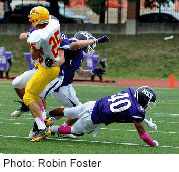- The Best Time of Day to Drink Bone Broth to Maximize Health Benefits
- 8 Ways to Increase Dopamine Naturally
- 7 Best Breads for Maintaining Stable Blood Sugar
- Gelatin vs. Collagen: Which is Best for Skin, Nails, and Joints?
- The Long-Term Effects of Daily Turmeric Supplements on Liver Health
- Could Your Grocery Store Meat Be Causing Recurring UTIs?
- Are You Making This Expensive Thermostat Error This Winter?
- Recognizing the Signs of Hypothyroidism
- 10 Strategies to Overcome Insomnia
- Could Artificial Sweeteners Be Aging the Brain Faster?
No Link Found Between Playing Football in Hot Weather, Concussion Risk


Dehydration may increase football players’ risk for concussion, but it’s unclear if playing in hot weather does, a new study finds.
The researchers noted that losing just 2 percent of the body’s water volume — which is easy to do when exercising for long stretches in hot weather — reduces the amount of cerebrospinal fluid. This fluid acts as a cushion to protect the brain from hitting the inside of the skull in the event of a hit to the head.
For the study, scheduled for presentation Monday at the Experimental Biology meeting in San Diego, the authors wondered if playing football during hot and humid weather might lead to a “perfect storm” of risk factors that boost the chances of concussion.
They analyzed data on 420 concussions suffered by NCAA football players during outdoor games between 2008 and 2012. They also examined temperature, humidity and wind speed during those games, according to a meeting news release.
The researchers theorized that if there were a link between temperature and concussion risk, they would find an increase in the number of concussions during games in hot, humid weather. But because football is primarily played in fall, very few games were played in this type of weather.
“Additionally, the high level of competition likely ensured that athletes were well prepared for games in all conditions. In the end, the overall rates of concussions were consistent across game time temperatures, but a link between dehydration and concussion rate may still exist,” researcher J. Craig Harwood and his University of Windsor colleagues wrote.
Because this study was presented at a medical meeting, the data and conclusions should be viewed as preliminary until published in a peer-reviewed journal.
More information
The U.S. National Library of Medicine has more about concussion.
Source: HealthDay
Copyright © 2026 HealthDay. All rights reserved.










